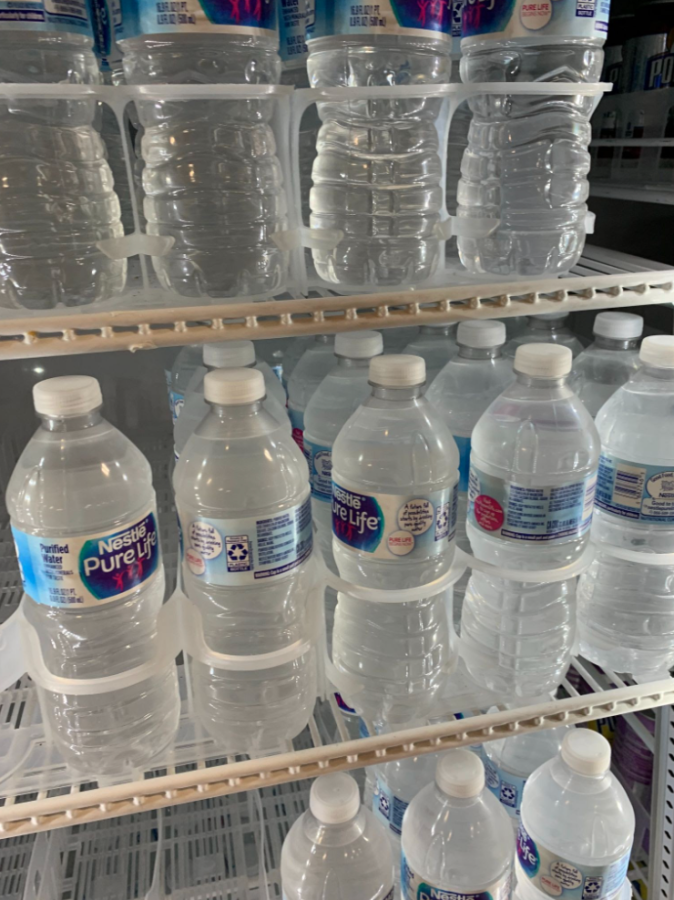Staples must stop stocking the cafeteria with Nestlé products
Despite Nestlé’s documented history of slavery, child endangerment and water theft, Staples continues to sell Nestlé Pure Life water bottles in the cafeteria. It is time for Staples to stand up against the injustices that Nestlé has committed and stop selling their products.
Nestlé is a company that has been part of my life since I was a toddler. I remember getting really excited for king-size Butterfinger and Kit-Kat bars on Halloween, begging my dad for Nesquik chocolate milk after every rec basketball game and eating fist-fulls of Cheerios out of a sandwich baggie on long car rides. Even in our cafeteria, Nestlé Pure Life water bottles line the refrigerator walls. As the largest food company in the world, according to Forbes, Nestlé is everywhere.
A couple of years ago, I saw the famous Oxfam monopoly diagram and realized just how many companies Nestlé owns. After a lot of research, I came to find out that the products I was consuming were created from the malpractice of an international conglomerate, and I don’t want their products in Staples.
After a lot of research, I came to find out that the products I was consuming were created from the malpractice of an international conglomerate, and I don’t want their products in Staples.
— Jake Fitzpatrick ’22
For example, according to the exposé by the anti-poverty charity ‘War on Want’ entitled “The Baby Killer,” Nestlé hired saleswomen in third-world countries to dress up as nurses and give out free medical advice and samples of their product. These samples would last just long enough for mothers to stop being able to produce milk, so that they were now dependent on the product. When mothers in poorer communities were then forced to use polluted water to mix the powdered baby formula and feed their babies, one could argue that the company was responsible for the deaths of approximately thousands of babies.
Despite the international outrage that followed, Nestlé chose to avoid responsibility, which eventually led to a United States Senate hearing the following year. During the hearing, Nestlé spokesperson Oswald Ballerin was asked to gauge Nestlé’s responsibility in the deaths and illnesses of infants. Instead of acknowledging any of Nestlé’s mistakes, Ballerin said that “we cannot have that responsibility sir,” he said. “How can I be responsible for the water supply?”
Nestlé has also gotten into scandals regarding the theft of drinking water. In 2013, a forensic audit report on Nestle Pakistan, found that they were diverting free water away from thousands of people who were then forced to drink polluted water.
In 2000, the companies Nestlé, Cadbury and Mars were exposed by the documentary “Slavery: A Global Investigation” for using forced trafficking and child labor to harvest cocoa beans. As of 2019, Nestlé could only trace 49% of its global cocoa supply to farms, leaving more than half of their cocoa unaccounted for according to The Washington Post.
By continuously buying their products, Staples is supporting Nestlé, a company with a history of child endangerment, theft, and slavery. While I understand that this was not the intention of the school administration, and that Nestlé products are difficult to avoid, on account of them being everywhere, it is in the best interest of the school to stand against companies that have a history of profiting through appalling means.
And to the students, teachers and parents who buy groceries from their household, I urge you to avoid Nestlé products. To reiterate, I understand that not buying Nestlé products is difficult, so you need not feel guilty for liking Kit-Kats or Hot Pockets; but if you can, be mindful of where the food you love comes from. Nestlés history of child endangerment, water theft, child labor and slavery are just cause for a boycott.

As staff writer Jake Fitzpatrick ’22 is embarking on his first year on Inklings, he hopes to write many articles voicing his opinions.
“My biggest...






















































